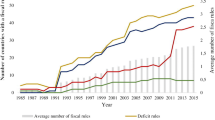Abstract
Fiscal pacts have recently played important roles in stabilization policies, particularly in Latin America. The ability of pacts to achieve austerity is examined in a game of competition among pressure groups for fiscal influence. Coalitions can freely communicate about what strategies to play and make contingent “threats” to the strategies of others. The credibility of fiscal pacts (strong, coalition-proof and far-sighted strong equilibria) is shown to depend critically on how acquiescence to private sector pressure enters the government's payoff function. We interpret these results in the context of austerity successes and failures in Mexico, Brazil, and Argentina.
Similar content being viewed by others
References
Addison, John T. and John Burton (1984) “The Sociopolitical Analysis of Inflation.” Weltwirtschaftliches Archiv 120, 90–120.
Arce M. Daniel G. (1994a) “Stability Criteria for Social Norms with Applications to the Prisoner's Dilemma.” Journal of Conflict Resolution 38, 749–765.
Arce M. Daniel G. (1994b) “Fiscal Policy and the Theory of Conflict Inflation.” The Manchester School 62, 425–437.
Aspe, Pedro (1992) “Macroeconomic Stabilization and Structural Change in Mexico.” European Economic Review 36, 320–328.
Aumann, Robert J. (1959) “Acceptable Points in General Cooperative n-Person Games.” Contributions to the Theory of Games 4, 287–324.
Baer, Werner (1987) “The Resurgence of Inflation in Brazil, 1974–86.” World Development 15, 1007–1034.
Baer, Werner and Paul Beckerman (1989) “The Decline and Fall of Brazil's Cruzado.” Latin American Research Review 24, 35–64.
Baer, Werner (1990) “Social Aspects of Latin American Inflations.” Quarterly Review of Economics and Business 31, 45–57.
Becker, Gary S. (1983) “A Theory of Competition Among Pressure Groups for Political Influence.” Quarterly Journal of Economics 48, 371–400.
Becker, Gary S. (1985) “Public Policies, Pressure Groups, and Dead Weight Costs.” Journal of Public Economics 28, 329–347.
Bernheim, B.D., B. Peleg, and M.D. Whinston (1987) “Coalition-Proof Nash Equilibria I. Concepts.” Journal of Economic Theory 42, 1–12.
Canavese, Alfredo (1982) “The Structuralist Explanation of the Theory of Inflation,” World Development 10, 523–559.
Canavese, Alfredo (1992) “Hyperinflation and Convertibility-Based Stabilization in Argentina.” In A.A. Zini (ed.), The Market and the State in Economic Development in the 1990s. Amsterdam: Elsevier Science.
Cauas, Jorge (1970) “Stabilization Policy-The Chilean Case.” Journal of Political Economy 78, 815–825.
DeCastro, Steve (1991) “Removing Inflation in a Macroeconomic Game Over the Distribution, With-out the Use of a Social Pact.” ANAIS do ANPEC 1, 41–48.
Dornbusch R., F. Sturtzenegger, and H. Wolf (1990) “Extreme Inflation: Dynamics and Stabilization.” Brookings Papers on Economic Activity 2, 1–64.
Heymann, Daniel and Fernando Navajas (1989) “Conflicto Distributivo y Deficit Fiscal. Notas Sobre la Experiencia Argentina.” Desarrollo Economico 29, 309–329.
Heymann, D., F. Navajas, and I. Warnes (1991) “Conflicto Distributivo y Deficit Fiscal. Algunos Juegos Inflacionarios.” El Trimestre Economico 58, 101–137.
Hirschman, Albert O. (1987) “Reflections on the Latin American Experience.” The Politics of Inflation and Economic Stagnation. Washington, D.C.: The Brookings Institution, pp. 53–77.
Laffond G. and H. Moulin (1981) “Stability by Threats and Counterthreats in Normal Form Games.” Mathematical Techniques of Optimization, Control, and Decision. Boston: Birkhauser, pp. 195–212.
Li, Shuhe (1992) “Far-sighted Strong Equilibrium and Oligopoly.” Economics Letters 40, 39–44.
Manzetti, L. (1994) “Institutional Decay and Distributional Coalitions in Developing Countries: The Argentine Riddle Reconsidered.” Studies in Comparative International Development 29, 82–114.
Navarette, J.E. (1990) “Mexico's Stabilization Program.” CEPAL Review 41, 31–44.
Paldam, Martin (1994) “The Political Economy of Stopping High Inflation.” European Journal of Political Economy 10, 135–168.
Postigo, William (1986) “Deficit Fiscal, Inflacion y Conflicto Social en el Peru.” Revista de Finanzas Publicas 11, 49–69.
Ros, Jaime (1993) “Inflaci ón Inercial y Conflicto Distributivo.” La Edad de Plomo Del Desarollo Latinomericano. Mexico City: Fondo de Cultura Econ ómica, pp. 59–84.
Rowthorn, R.E. (1977) “Conflict, Inflation, and Money.” Cambridge Journal of Economics 1, 215–239.
Roxborough, Ian (1992) “Inflation and Social Pacts in Brazil and Mexico.” Journal of Latin American Studies 24, 639–664.
Simonsen, Mario (1988a) “Price Stabilization and Incomes Policies: Theory and the Brazilian Case Study.” Inflation Stabilization. Cambridge: MIT Press, pp. 259–286.
Simonsen, Mario (1988b) “Rational Expectations, Game Theory and Inflationary Inertia.” The Economy as a Complex System. N.Y.: Addison-Wesley, pp. 204–241.
Tornell, Aaron (1995) “Are Economic Crises Necessary for Trade Liberalization and Fiscal Reform? The Mexican Experience.” In Reform, Recovery, and Growth. Chicago: University of Chicago Press, pp. 53–73.
Xue, Licun (1996) “Coalitional Stability in Strategic Situations.” Unpublished Ph.D. dissertation, McGill University.
Author information
Authors and Affiliations
Rights and permissions
About this article
Cite this article
Arce, D.G. Fiscal Pacts. Open Economies Review 8, 271–284 (1997). https://doi.org/10.1023/A:1008294815489
Issue Date:
DOI: https://doi.org/10.1023/A:1008294815489




